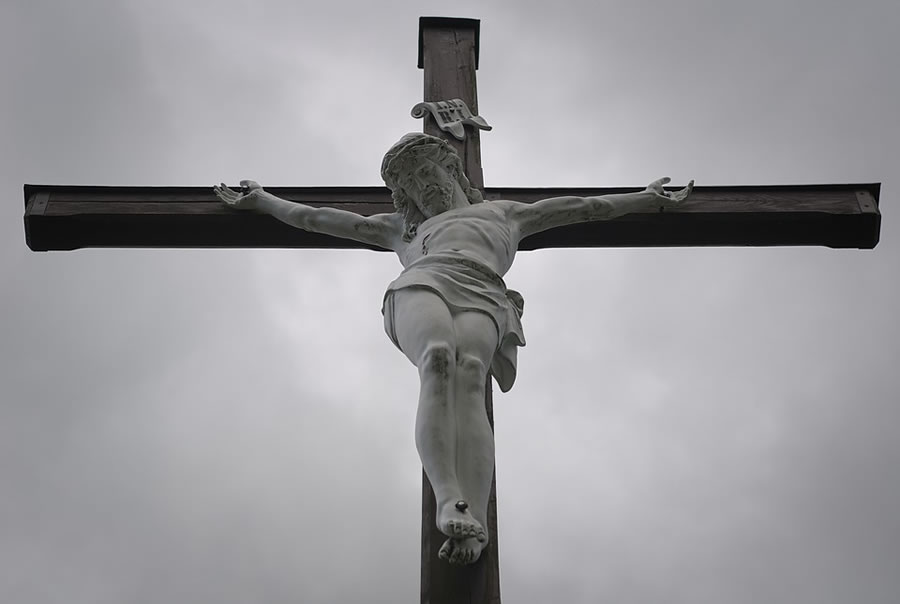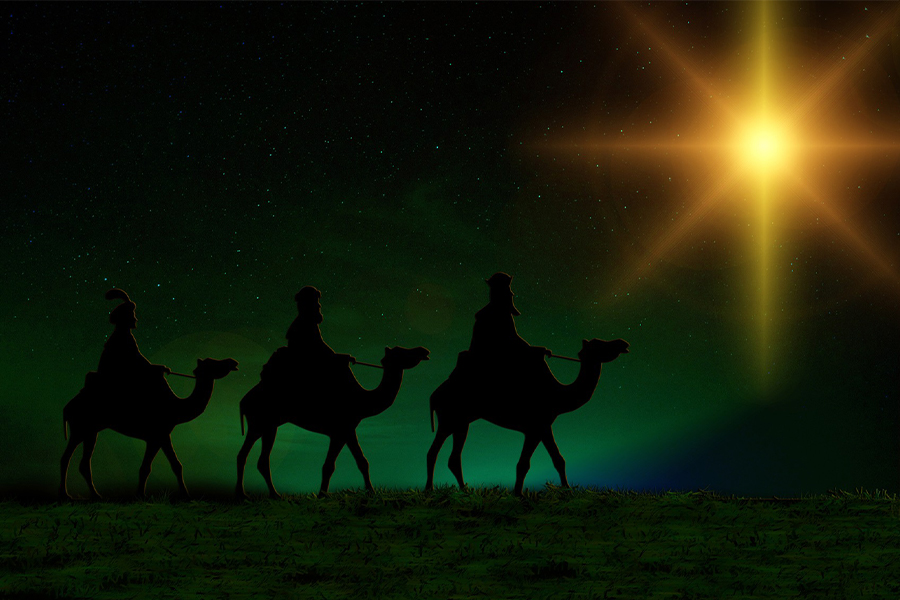St. Francis of Assisi Weekly Reflections

Love... The Greatest Gift of All
01-30-2022Weekly ReflectionWe Celebrate Worship Resource, Vol. 47, No. 1Saint Paul did not write letters to far-flung Christian communities just to keep in touch. No, he sent letters because debates, disagreements, and outrightdivisions had broken out among its members. Disagreements were to be expected, but divisions were dangerous and distressing. Paul wanted to make sure that Corinth avoided division. Jesus had been confronted with similar discord in his hometown when he explained that like the prophets of old, he was not sent to help the faithful of his native place. Indeed, Jesus would go on to spend his time with sinners and foreigners. Matthew and Mark mention that the people of Nazareth were unbelieving. But Luke—the only evangelist to tell the parable of the good Samaritan and the account of the ten lepers (when only the Samaritan returned to give thanks) - writes that the townsfolk turn furious and homicidal. With reactions like this in mind, Paul wants to emphasize to the church in Corinth that love is the greatest of all spiritual gifts. We are blessed with it, capable of it. With love, disagreements are resolved without discord, for love seeks the truth, not its own interests. Love bears differences, for it endures beyond disagreements.
What disagreement has affected you recently? How can love help to resolve it?
Amor... El Mayor de Todos los Dones
San Pablo no escribió cartas a comunidades cristianas remotas sólo para mantenerse en contacto. No, enviaba cartas porque entre sus miembros se habían desatado debates, desavenencias y francas divisiones. Los desacuerdos eran de esperar, pero las divisiones eran peligrosas y angustiosas. Pablo quería asegurarse de que Corinto evitara la división. Jesús se enfrentó a una discordia similar en su ciudad natal cuando explicó que, como los profetas de antaño, no fue enviado para ayudar a los fieles de su lugar de origen. De hecho, Jesús pasaría su tiempo con pecadores y extranjeros. Mateo y Marcos mencionan que la gente de Nazaret era incrédula. Pero Lucas, el único evangelista que cuenta la parábola del buen samaritano y el relato de los diez leprosos (cuando sólo el samaritano volvió a dar gracias), escribe que la gente del pueblo se vuelve furiosa y homicida. Con reacciones como esta en mente, Pablo quiere enfatizar a la iglesia de Corinto que el amor es el mayor de todos los dones espirituales. Somos bendecidos con ello, somos capaces de ello. Con amor se resuelven los desacuerdos sin discordia, porque el amor busca la verdad, no sus propios intereses. El amor soporta las diferencias, porque perdura más allá de los desacuerdos.
¿Qué desacuerdo te ha afectado recientemente? ¿Cómo puede el amor ayudar a resolverlo?
Facing Rejection
01-28-2022Question of the WeekReading I: Jeremiah 1:4-5, 17-19 -Prophet consecrated to God
Reading II: 1 Corinthians 12:31-13:13 -Love never fails
Gospel: Luke 4:21-30 - Beginning of preaching; rejection by the townspeople
Key Passage:
They got up, drove him out of the town, and led him to the brow of the hill on which their town was built, so that they might hurl him off the cliff. But he passed through the midst of them and went on his way. (Lk. 4:29– 30)
Adults: What do you do when a message you are trying to deliver "falls on deaf ears"?
Kids: Are there times when you have not listened as well as you could to what someone was telling you? Why didn't you?
Enfrentando el Rechazo
Lectura I: Jeremías 1:4-5, 17-19 -Profeta consagrado a Dios
Lectura II: 1 Corintios 12:31-13:13 -El amor nunca falla
Evangelio: Evangelio Lucas 4:21-30 -Comienzo de la predicación; rechazo de la gente del pueblo
Pasaje Clave:
Levantándose, lo sacaron de la ciudad y lo barranco del monte, sobre el que estaba llevaron hasta un construida la ciudad, para despena. Pero el, pasando por en medio de ellos, se alejó de ahí. (Lucas 4:29–30)
Adultos: ¿Qué haces cuando un mensaje que estás tratando de entregar "cae en oídos sordos"?
Niños: ¿Hay momentos en los que no has escuchado lo mejor que podías lo que alguien te decía? ¿Por qué no lo hiciste?

Today this Scripture passage is Fulfilled
01-23-2022Weekly ReflectionWe Celebrate Worship Resource, Vol. 47, No. 1Today this scripture passage is fulfilled in your hearing” (Luke 4:21). Jesus stuns the faithful of his hometown when he follows the passage from Isaiah with these words. They cannot imagine that their native son is the Messiah whom Isaiah prophesized. What began as just an ordinary sabbath in the synagogue became anything but. The worship service we hear about in Nehemiah is a special one to begin with. Ezra gathered the faithful out in the open, which was noteworthy, for they had just returned to Jerusalem after years of exile. After he read from the Torah, the people wept. Perhaps worshiping in the holy city once again overwhelmed them, perhaps it was remorse for presumed sin, or perhaps God’s laws felt like too much. Whatever the case, Nehemiah assures them of how special this day is: “Today is holy to our Lord” (Nehemiah 8:10). We know that Jesus is present with us whenever we gather in his name. So the “today” we hear is not just in the fifth century BC or the first century AD. It is here and now. For today, this very day, the Anointed One is here, bringing glad tidings to the poor and proclaiming liberty, healing, and jubilee year to us all.
How can you—who have put on Christ in baptism—make today special in the Lord?
Hoy mismo se ha Cumplido este pasaje
Hoy mismo me ha cumplido este pasaje de la Escritura que acaban de oír” (Lucas 4:21). Jesús aturde a los fieles de su ciudad natal cuando sigue el pasaje de Isaías con estas palabras. No pueden imaginar que su hijo nativo es el Mesías a quien Isaías profetizó. Lo que comenzó como un sábado ordinario en la sinagoga se convirtió en algo menos. El servicio de adoración que escuchamos en Nehemías es uno especial para empezar. Ezra reunió a los fieles al aire libre, que fue notable, porque acababan de regresar a Jerusalén después de años de exilio. Después de leer de la Torá, la gente lloró. Tal vez adorar en la Ciudad Santa una vez más los abrumó, tal vez fue remordimiento por el presunto pecado, o quizás las leyes de Dios se sentían como demasiado. Cualquiera que sea el caso, Nehemías les asegura cómo es especial este día: “Hoy es un día consagrado al Señor” (Nehemías 8:10). Sabemos que Jesús está presente con nosotros cuando nos reunimos en su nombre. Entonces, el “Hoy” que escuchamos no es solo en el siglo BC o en el primer siglo. Está aquí y ahora. Por hoy, este mismo día, el ungido está aquí, brotando nuevas noticias a los pobres y proclamando la libertad, la sanación y el año de celebración a todos.
¿Cómo puedes tu — quién te has vestido de Cristo en el bautismo— hacer que hoy sea especial para el Señor?
Time Accepting Responsibility
01-23-2022Question of the WeekReading I: Nehemiah 8:2-4a, 5-6, 8-10 - Ezra reads the law
Reading II: 1 Corinthians 12:12-30 - Analogy of the body
Gospel: Luke 1:1-4; 4:14-21 - Beginning of Jesus' preaching
Key Passage:
Jesus unrolled the scroll and found the place where it was written: “The Spirit of the Lord is upon me, because he has anointed me to bring good news to the poor.” (Luke 4:17b–18a)
Adults: What do you believe that the anointing you received at baptism requires you to do?
Kids: What could you do this week for someone who has less than you?
Tiempo de Acepyaar Responsabilidad
Lectura I: Nehemías 8:2-4a, 5-6, 8-10 - Esdras lee la ley
Lectura II: 1 Corintios 12:12-30 - Analogía del cuerpo
Evangelio: Lucas 1:1-4; 4:14-21 - Comienzo de la predicación de Jesús
Pasaje Clave:
Jesús desenrolló el rollo y encontró el lugar donde estaba escrito: “El Espíritu del Señor está sobre mí, porque me ha ungido para llevar a los pobres la buena nueva.” (Lucas 4:17b–18a)
Adultos: ¿Qué crees que requiere que hagas la unción que recibiste en el bautismo?
Niños: ¿Qué podrías hacer esta semana por alguien que tiene menos que tú?

Converting into Something New
01-15-2022Weekly ReflectionWe Celebrate Worship Resource, Vol. 47, No. 1Ostensibly, the Gospel passage we hear today was placed at the beginning of Ordinary Time because it comes at the beginning of John’s Gospel. However, its placement a week after the feast of Baptism of the Lord is also appropriate, for this passage is all about conversion. The miracle Jesus accomplished at the wedding at Cana converted water into wine, but also converted the hearts and minds of his disciples, who were still coming to an understanding of this man they called Rabbi (Teacher) and Messiah. Isaiah’s poetry celebrates the conversion of the holy city and its people from defeated and desolate to victorious and vindicated, even using the language of a wedding ceremony to describe the joy and promise of God’s care. This wedding reception at Cana is Jesus’ first recorded meal with his disciples. At their last meal, he used water from similar jars to wash his disciples’ feet as a model of service, then changed wine into his Blood. In Jesus, the ordinary is converted into something new, something greater, something glorious. May our own continual conversion, expressed in the spiritual gifts we have received, be as well.
How has your world been converted through the workings of our Lord?
Convertiendonos en Algo Nuevo
Aparentemente, el pasaje del Evangelio que escuchamos hoy se colocó al comienzo del Tiempo Ordinario porque viene al comienzo del Evangelio de Juan. Sin embargo, también es apropiado colocarlo una semana después de la fiesta del Bautismo del Señor, ya que este pasaje tiene que ver con la conversión. El milagro que realizó Jesús en las bodas de Caná convirtió el agua en vino, pero también convirtió el corazón y la mente de sus discípulos, que aún estaban llegando a comprender a este hombre al que llamaban Rabí (Maestro) y Mesías. La poesía de Isaías celebra la conversión de la ciudad santa y su gente de derrotados y desolados a victoriosos y vindicados, incluso usando el lenguaje de una ceremonia nupcial para describir el gozo y la promesa del cuidado de Dios. Esta recepción de bodas en Caná es la primera comida registrada de Jesús con sus discípulos. En su última comida, usó agua de tinajas similares para lavar los pies de sus discípulos como modelo de servicio, luego transformó el vino en su Sangre. En Jesús, lo ordinario se convierte en algo nuevo, algo más grande, algo glorioso. Que nuestra propia conversión continua, expresada en los dones espirituales que hemos recibido, lo sea también.
¿Cómo se ha convertido tu mundo a través de las obras de nuestro Señor?
Thinking of Others
01-15-2022Question of the WeekReading I: Isaiah 62:1-5 - Jerusalem the Lord's bride
Reading II: 1 Corinthians 12:4-11 - Variety and unity
Gospel: John 2:1-11 - The wedding at Cana
Key Passage: When the wine gave out, the mother of Jesus said to him, “They have no wine.” (Jn. 2:3)
Adults: When have you stepped in, as Mary did at Cana, to try and make a difficult situation easier for someone?
Kids: What can you do this week to help make someone's job a little easie
Pregunta de la Semana
Lectura I: Isaías 62:1-5 - Jerusalén la novia del Señor
Lectura II: 1 Corintios 12:4-11 - Variedad y unidad
Evangelio: Juan 2:1-11 - Las bodas de Caná
Pasaje Clave: Cuando se terminó el vino, la madre de Jesús le dijo: “Ya no tienen vino.” (Juan 2:3)
Adultos: ¿Cuándo has intervenido, como lo hizo María en Caná, para tratar de hacer una situación difícil para alguien más fácil ?
Niños: ¿Qué puedes hacer esta semana para ayudar a que el trabajo de alguien sea un poco más fácil?
Pleasing to God
01-09-2022Question of the WeekReading I: Isaiah 40:1-5, 9-11 - Prepare the Way of the Lord
Reading II: Titus 2:11-14; 3:4-7 - The Grace of God
Gospel: Luke 3:15-16, 21-22 - Baptism of Jesus
Key Passage: And a voice came from heaven, "You are my Son, the Beloved; with you I am well pleased. (Luke 3:22)
Adults: Do you think that God was "well pleased" by your actions in recent weeks? Why?
Kids: What good thing could you do this week that would be pleasing to God?
Agradable Para Dios
Lectura I: Isaías 40:1-5, 9-11 -Preparen el Camino del Señor
Lectura II: Tito 2:11-14; 3:4-7 - La Gracia de Dios
Evangelio: Lucas 3:15-16, 21-22 - El bautismo de Jesús
Pasaje Clave: Y vino una voz del cielo: “Tú eres mi Hijo, el predilecto; en ti me complazco.” (Lucas 3:22)
Adultos: ¿Crees que Dios estaba “complacido” con tus acciones en las últimas semanas? ¿Por qué?
Niños: ¿Qué cosas buenas podrías hacer esta semana que le agradarían a Dios?

With You I am Well Pleased
01-09-2022Weekly ReflectionWe Celebrate Worship Resource, Vol. 47, No. 1While the Chosen People suffered in exile, a voice called out to a young prophet. The voice spoke with words of power and promise, words of comfort and tenderness, words of hope and blessing. This voice was God’s. That voice is heard once again many centuries later after Jesus is baptized. The Lord’s message to Jesu is much simpler and straightforward: “You are my beloved Son; with you I am well pleased” (Luke 3:22). No “bring forth justice,” “open the eyes of the blind,” or “the glory of the Lord shall be revealed” is necessary, for all this is already present in the person of Jesus (Isaiah 42:1, 7, 40:5). From this point on, filled with the Holy Spirit, Jesus brings forth justice, open the eyes of the blind, and reveals the Father's glory. Baptized in Christ, we too are changed to listen for the Lord’s voice. Empowered by the Holy Spirit, who descended upon us at our baptism, we are called to prepare the way, just as Isaiah and John and Peter and Paul and Titus were, so that justice and peace and kindness and love may spread to every nation, to every people. We too are God’s beloved children. May the Lord be well pleased with us.
How is God calling you to live out your baptismal commitment?
En Ti me Complazco
Mientras el Pueblo Elegido sufría en el exilio, una voz llamó a un joven profeta. La voz habló con palabras de poder y promesa, palabras de consuelo y ternura, palabras de esperanza y bendición. Esta voz era de Dios. Esa voz se escucha una vez más muchos siglos después del bautismo de Jesús. El mensaje del Señor a Jesús es mucho más simple y directo: “Tú eres mi Hijo amado; en ti me complazco” (Lucas 3:22). No es necesario “brillar la justicia”, “abrir los ojos de los ciegos”, o “muchas veces la gloria del Señor será revelada”, porque todo esto ya está presente en la persona de Jesús (Isaías 42:1, 7, 40:5). A partir de este momento, lleno del Espíritu Santo, Jesús trae justicia, abre los ojos de los ciegos y revela la gloria del Padre. Bautizados en Cristo, también nosotros somos transformados para escuchar la voz del Señor. Fortalecidos por el Espíritu Santo, que descendió sobre nosotros en nuestro bautismo, estamos llamados a preparar el camino, como lo fueron Isaías, Juan, Pedro, Pablo y Tito, para que la justicia, la paz, la bondad y el amor se extiendan a todas las naciones, a cada pueblo. Nosotros también somos los hijos amados de Dios. Que el Señor esté complacido con nosotros.
¿Cómo te está llamando Dios a vivir tu compromiso bautismal?
Overcoming Jealousy
01-02-2022Question of the WeekReading I: Isaiah 60:1-6 - Glory of the new Zion
Reading II: Ephesians 3:2-3a, 5-6 -Commission to preach God's plan
Gospel: Matthew 2:1-12 - The visit of the Magi
Key Passage:
Then Harod sent the [magi] to Bethlehem saying, “Go and search diligently for the child; and when you have found him bring me word so that I may also go and pay him homage.” (Matthew 2:8)
Adults: When have you been jealous or fearful of another person? When are such feelings harmful?
Kids: When have you been jealous because something good happened to another person instead of you? What is the problem with feeling that way?
Superar los Celos
Lectura I: Isaías 60:1-6 - Gloria de la nueva Sión
Lectura II: Efesios 3:2-3a, 5-6 -Comisión para predicar el plan de Dios
Evangelio: Mateo 2:1-12 - La visita de los Reyes Magos
Pasaje Clave:
Entonces Herodes envió a los [magos] a Belén, diciendo: “Id y buscad diligentemente al niño; y cuando lo encuentren, avísame para que yo también vaya a adorarlo.” (Mateo 2:8)
Adultos: ¿Cuándo has tenido celos o miedo de otra persona? ¿Cuándo son dañinos esos sentimientos?
Niños: ¿Cuándo has estado celoso porque le pasó algo bueno a otra persona en lugar de a ti? ¿Cuál es el problema de sentirte así?

The Light of the World
01-02-2022Weekly ReflectionWe Celebrate Worship Resource, Vol. 47, No. 1Just over a week ago we celebrated Jesus’ birth. We heard Isaiah prophesy that the Lord would come as a light in the darkness and John confirm that the darkness would not overcome it. Today we celebrate the effect of this light, the extent of this light, and the power of this light. Isaiah, returning to the ruins of Jerusalem, envisions a city restored to glory, so radiant that its light will draw Arabians from north (the nomads of Midian) to south (the traders of Sheba), outsiders both. The psalmist sings of all the nations on earth being attracted to God’s glory, demonstrated not by triumph in war, but by the triumph of peace: a “profound peace” (72:7) marked by care for the poor, the afflicted, and the lowly. Paul, enlightened by the revelation of the Holy Spirit, testifies that the Gentiles are members—not of a supplemental body, or even a complementary body—but of the same body, fully part of the one body of Christ. Finally, in the Gospel we hear of the light from the star, that light that leads the magi from the east with their gifts and devotion. Jesus, the Light of the World, shines forth to all, for all, over all, one body of Christ.
How have you seen Christ’s light in your life?
La Luz del Mundo
Hace poco más de una semana celebramos el nacimiento de Jesús. Escuchamos a Isaías profetizar que el Señor vendría como una luz en las tinieblas y Juan confirmó que las tinieblas no lo vencerían. Hoy celebramos el efecto de esta luz, la extensión de esta luz y el poder de esta luz. Isaías, al regresar a las ruinas de Jerusalén, imagina una ciudad restaurada a la gloria, tan radiante que su luz atraerá a los árabes del norte (los nómadas de Madián) al sur (los comerciantes de Sabá), ambos forasteros. El salmista canta que todas las naciones de la tierra se sienten atraídas por la gloria de Dios, demostrada no por el triunfo en la guerra, sino por el triunfo de “la paz” (71:7) marcada por el cuidado de los pobres, los afligidos y los humildes. Pablo, iluminado por la revelación del Espíritu Santo, testifica que los gentiles son miembros, no de un cuerpo suplementario, ni siquiera de un cuerpo complementario, sino del mismo cuerpo, plenamente parte del único cuerpo de Cristo. Finalmente, en el Evangelio escuchamos de la luz de la estrella, esa luz que guía a los magos de oriente con sus dones y devoción. Jesús, la Luz del Mundo, brilla para todos, por todos, sobre todos, un solo cuerpo de Cristo.
¿Cómo has visto la luz de Cristo en tu vida?